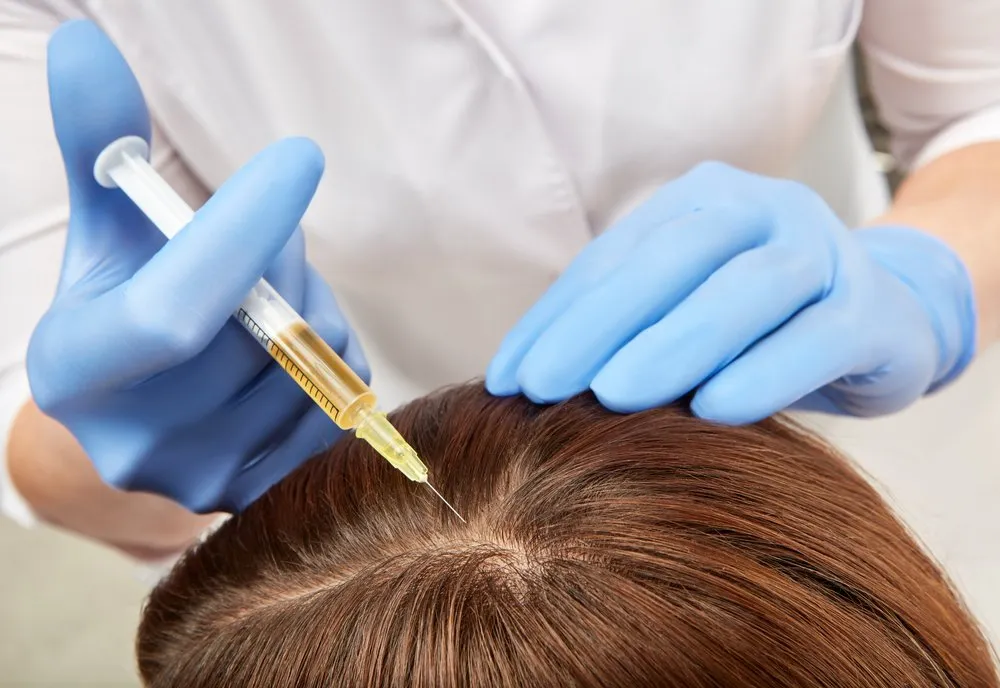Do you have hair loss and eye problems at the same time, such as thinning lashes, eyebrow loss, or blurred vision?
These issues are more connected than most people realize. In this article, we explain why hair loss and eye symptoms occur together, how to spot warning signs early, and the most effective treatment options.
With insights from medical experts and the latest research, you’ll learn practical steps to protect both your hair and vision.
What is “Hair Loss and Eye Problems”?

Hair loss is not limited to the scalp. It can also affect eyebrows, eyelashes, and, indirectly, your eye health. When these conditions overlap, it may indicate deeper medical causes such as autoimmune disease, hormonal imbalance, or nutritional deficiency.
Defining Hair Loss — Types and Locations
- Scalp alopecia: Androgenetic alopecia (pattern baldness), alopecia areata, telogen effluvium.
- Eyebrow and eyelash loss (madarosis): Common in alopecia areata, thyroid disease, or as a side effect of medications.
What Eye Problems Are We Talking About?
Hair loss can be linked with:
- Dry eyes
- Blepharitis (eyelid inflammation)
- Vision changes or refractive errors
- Retinal disorders in rare genetic conditions
Why the Connection Exists
Shared mechanisms explain the overlap:
- Autoimmunity (e.g., alopecia areata and thyroid eye disease)
- Inflammation damages both hair follicles and ocular tissues
- Nutritional deficiencies (iron, vitamin D, biotin)
- Hormonal or medication-related effects
Common Eye Symptoms Associated with Hair Loss
Eyelash & Eyebrow Loss (Madarosis)
Eyelashes and brows are more than cosmetic—they shield the eyes from dust, sweat, and pathogens. When lost:
- The eye surface is exposed to dryness and irritation.
- Patients may experience light sensitivity, frequent eye infections, or chronic discomfort.
Dry Eye, Blepharitis, and Lid Margin Problems
- Reduced lash density alters tear distribution.
- Lid margin inflammation (blepharitis) can worsen eye irritation and blur vision.
Refractive Errors & Visual Disturbances
Some patients with alopecia areata show higher rates of refractive issues, such as astigmatism or hyperopia, though research is ongoing.
Retinal Effects & Rare Genetic Conditions
Rare syndromes, such as Hypotrichosis with Juvenile Macular Dystrophy, cause both hair loss and progressive vision loss.
Risk Factors & Causes that Link Hair Loss & Eye Issues
Autoimmune Disorders
- Alopecia areata: The Immune system attacks hair follicles and may also inflame ocular tissues.
- Lupus, thyroid disease can simultaneously damage hair and eyes.
Hormonal Imbalances & Thyroid Disease
Hyperthyroidism and hypothyroidism cause lash/brow thinning and are linked to thyroid eye disease.
Nutritional Deficiencies
- Iron deficiency → hair shedding + pale conjunctiva.
- Vitamin D deficiency → associated with alopecia areata and dry eye.
Medications & Cosmetic Procedures
- Chemotherapy drugs → lash/brow loss.
- Long-term glaucoma medications (prostaglandin analogs) → lash changes.
- Lash extensions/adhesives → follicle trauma + irritation.
Trauma & Environmental Factors
Burns, over-plucking, or exposure to pollutants may damage follicles and irritate eyes.
Diagnosis — How Doctors Identify Eye Problems in Hair Loss Patients
Patient History
Doctors will ask about:
- Onset and pattern of hair loss
- Eye symptoms: dryness, redness, blurring, light sensitivity
- Family history of autoimmune disease
Physical Examination
- Scalp and brow inspection
- Eyelash density and lid margin assessment
Ocular Tests
- Schirmer test for tear production
- Tear break-up time (TBUT)
- Slit lamp exam for lid and corneal health
- Fundoscopy or OCT for retinal involvement
When to Refer
Patients with both hair and eye symptoms benefit from combined care: dermatologist + ophthalmologist.
Treatment & Management
Managing Hair Loss
- Topical therapies: Minoxidil, corticosteroids
- Oral options: Finasteride, JAK inhibitors (for alopecia areata, under review)
- Advanced care: PRP therapy, hair transplant (for scalp)

Treating Eye Symptoms
- Dry eye: Artificial tears, warm compresses, omega-3 supplements
- Blepharitis: Lid hygiene, topical antibiotics if infection present
- Inflammation: Steroid or cyclosporine drops (prescription only)
Lash & Brow Restoration
- Prostaglandin analogs (e.g., bimatoprost)
- Cosmetic solutions: brow microblading, lash extensions (done safely)
- Hair transplant techniques for brows
Lifestyle & Nutrition
- Balanced diet (iron, biotin, zinc, vitamin D)
- Avoid smoking and excessive alcohol use
- Reduce eye strain with screen breaks
Prognosis & Recovery Timeline
- Mild cases (dry eye, lash shedding): improvement in weeks to months with proper treatment.
- Autoimmune-related cases: may relapse but respond to early intervention.
- Genetic syndromes require long-term management, as vision loss may progress.
Preventive Strategies & When to Seek Help
Warning Signs
- Sudden lash or brow loss
- Persistent dry eye or redness
- Vision changes
Best Practices for Prevention
- Maintain eyelid hygiene
- Use gentle cosmetics
- Ensure adequate vitamin and iron intake
Regular Check-Ups
- Annual dermatology and eye exams for at-risk
- More frequent follow-up in autoimmune disease patients
Frequently Asked Questions (FAQs)
Does hair loss always lead to eye problems?
No, but certain causes (like alopecia areata or thyroid disease) increase the risk.
Can eye problems cause hair loss?
In some cases, yes. Chronic blepharitis or lid inflammation can damage lash follicles.
Are these problems permanent?
Most cases improve with treatment, but genetic syndromes may cause permanent vision loss.
What can I do at home to help?
Maintain good nutrition, practice lid hygiene, and use artificial tears for dryness.
When should I see a doctor?
If you notice lash loss, persistent eye irritation, or vision changes, consult a specialist immediately.
What You Should Do Next
If you’ve noticed both hair loss and eye symptoms, it’s important not to ignore them. Early diagnosis and combined treatment from a dermatologist and ophthalmologist can prevent long-term complications.
👉 Book a consultation with Dr. Rana Irfan in Islamabad today to get a personalized treatment plan for your hair and eye health.
